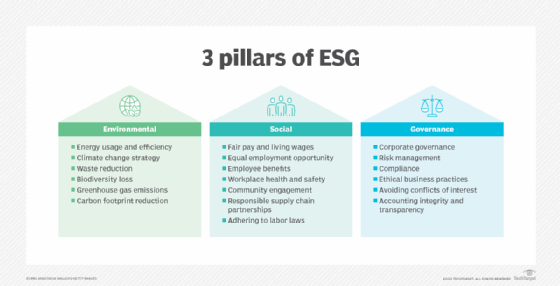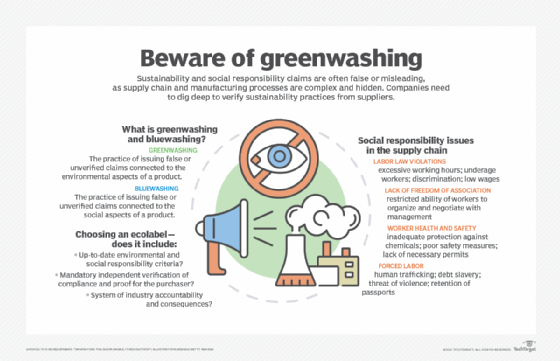What is ESG reporting? Importance and how to get started
ESG reporting is a type of corporate disclosure that details an organization's environmental, social and governance (ESG) promises, efforts and progress.
Although organizations have long had to report on financial and operational performance attributes, ESG reporting is a newer phenomenon that gained traction in the early 2000s. The term ESG describes an organization's sustainable and ethical impact on the environment, society and governance.
An ESG report is an opportunity for an organization to provide a milestone update on progress toward environmental, sustainability and corporate governance goals. Its aim is to provide an accurate account of efforts undertaken and the expected impact of those efforts, from both a qualitative and quantitative perspective, with ESG data. An ESG report is much like an annual report, or other forms of corporate disclosure, serving as a communication tool to provide information to employees, investors and regulatory authorities.

Why is ESG reporting important for organizations?
ESG reporting is important for the following reasons, making it a corporate mainstay across industries and jurisdictions:
- Transparency. As concerns about climate change and corporate social responsibility increase, organizations must be transparent about how their operations affect these areas. ESG reporting provides that transparency, giving organizations ways to report on ESG efforts and progress.
- Investor demand. Investors have long relied on all manner of ESG metrics to gauge an organization's value and growth potential. An ESG report is another critical piece of information used to help make investment decisions.
- Brand loyalty. Consumers choose to do business with organizations that align with their beliefs about governance and sustainability. Consumers are likely to exhibit more brand loyalty with those organizations that report on ESG initiatives and on progress in areas they value.
- Compliance. A growing number of regulations globally require organizations to disclose and report on ESG initiatives, sustainability and governance. An ESG report provides a way for organizations to make proper disclosures and helps ensure regulatory compliance.
- Risk management. ESG-related issues can expose organizations to risk. An ESG report is an opportunity to avoid those issues by disclosing activities and identifying potential areas of risk, such as negative environmental impacts or supply chain disruptions.
- Innovation. ESG reporting can also offer business benefits that help drive and improve ESG strategies. Reporting can help push an organization to enhance efficiency and identify areas that need improvement.
- Goal tracking. An ESG report holds organizations accountable for their ESG performance, claims and strategy. It also helps them track progress on goals, as many targets are multiyear, long-term strategies that play out over time.
Are companies required to do ESG reporting?
Depending on the location of the company's headquarters, there can be national or local jurisdiction-level regulations for ESG reporting. Specific industries are also creating a growing number of regulations calling for some form of ESG reporting.
This article is part of
ESG strategy and management guide for businesses
European Union
In the EU, the Sustainable Finance Disclosure Regulation went into effect in March 2021. It requires ESG reporting with a focus on sustainability-related initiatives. That regulation is complemented by the Corporate Sustainability Reporting Directive (CSRD), which went into effect in January 2023. The Omnibus Simplification Package proposed in February 2025 is designed to reduce compliance burdens, limit CSRD applicability and reduce the scope of due diligence.
United Kingdom
The CSRD strengthened EU social and environmental reporting rules. Large organizations in the U.K. are required to report using the Streamlined Energy and Carbon Reporting (SECR) framework. Several ESG changes are pending in 2025, including a U.K. Sustainability Reporting Standards national framework based on International Financial Reporting Standards (IFRS) and International Sustainability Standards Board (ISSB) standards, new Financial Conduct Authority prospectus rules for ESG-labeled debt and the implementation of a U.K. Green Taxonomy.
United States
In recent years, publicly traded corporations have come under increasing pressure to create ESG reports. In March 2024, the U.S. Securities and Exchange Commission (SEC) adopted rules to standardize how public companies report climate-related risk. Individual exchanges, including the New York Stock Exchange and the Nasdaq Composite, have encouraged issuers to provide ESG reporting.
Although ESG reporting isn't mandatory at the federal level, a 2024 report from the Governance & Accountability Institute found that 98% of companies on the S&P 500 index published an ESG report in 2023.
In October 2023, California enacted two laws that require large businesses operating in the state to disclose climate-related financial risks and their efforts to mitigate such risks: the Climate Corporate Data Accountability Act and the Climate-Related Financial Risk Act. New York and Illinois are developing similar laws requiring large businesses with more than a billion dollars in revenue to report environmental information, such as emissions.
Recent policy shifts at the federal level could seriously affect ESG reporting, moving forward. The SEC has voted to stop defending its own climate-related disclosure rules, for instance. U.S. support for the Paris Agreement international climate commitment has been rolled back by executive order. Additionally, the U.S. House Financial Services Committee has formally requested that the SEC repeal ESG disclosure requirements.
ESG reporting might not be a legal or regulatory requirement for all companies in every jurisdiction, but not having a report can lead to issues. A company that doesn't have an ESG report will be conspicuous in its absence, leading potential investors, consumers and employees to question its position on ESG issues.
ESG reporting frameworks to consider using
ESG reports follow a specific approach or framework that provides guidance and structure on how the report and its findings must be measured and communicated. Organizations can use the following reporting processes and frameworks:
- Carbon Disclosure Project. CDP is a global nonprofit founded in 2000. Companies use its environmental disclosure framework to report on climate-related business risks and opportunities and other environmental topics. Over 22,700 companies worldwide, as well as many city governments, use this framework.
- Climate Disclosure Standards Board Framework. The CDSB Framework was a model designed to help organizations measure the environmental side of ESG reporting. Although some ESG reports still use the framework, it was merged into the IFRS Foundation in January 2022 to create the ISSB alongside the Sustainability Accounting Standards Board (SASB).
- Global Reporting Initiative Standards. The GRI Standards aim to provide a set of sustainability standards for reporting. GRI has segmented its reporting model into a modular approach that includes sector standards for specific industries and a universal standard that applies across all domains.
- IFRS Sustainability Disclosure Standards. The ISSB, which is part of the IFRS, developed a new set of standards that builds on the CDSB and SASB frameworks. The new framework is an attempt to create a consolidated and comprehensive view of sustainability efforts in a reporting organization. Its first two standards -- Sustainability Disclosure Standards IFRS S1 General Requirements for Disclosure of Sustainability-related Financial Information and IFRS S2 Climate-related Disclosures -- were released in June 2023.
- SECR. The U.K. has developed its own reporting framework and guidance for ESG reporting. The SECR goes beyond reporting numbers alone, requiring that organizations provide a detailed explanation of sustainability efforts. The SECR uses greenhouse gas reporting standards to provide a method for reporting on carbon emissions data.
- SASB. he SASB Framework incorporates ESG information into financial reporting on an organization's sustainability efforts. SASB got its start in 2011. In 2022, it was consolidated into the IFRS to build a new framework for ESG reporting.
- Taskforce on Climate-related Financial Disclosures. The Financial Stability Board created the first set of TCFD recommendations in 2017. The TCFD approach included four thematic areas: governance, strategy, risk management, and metrics and targets. These areas were interrelated and support 11 recommended ESG disclosures that provide information for investors and other interested parties to understand how companies evaluate and address climate risk. The TCFD disbanded in 2023.
- United Nations Guiding Principles Reporting Framework (UNGPRF). The U.N. has many reporting frameworks that are applicable to ESG, including the UNGPRF. It focuses on ethical governance and issues related to human rights. Alongside the UNGPRF is the complementary U.N. Global Compact, which provides guidance on helping organizations adopt sustainable practices.
- Workforce Disclosure Initiative. In 2016, ShareAction, a charity that supports responsible ESG investments, created this framework. Its surveys focus on reporting workforce management data. In 2024, 230 companies worldwide participated in the survey and shared their workforce management policies as well as other information, such as employee well-being, health and safety initiatives.
ESG reporting challenges
ESG reporting isn't as simple as preparing a report based on accessible information and knowing exactly what to include. Common challenges with ESG reporting include the following:
- Locating and collecting ESG data. Finding and collecting data from many sources is particularly difficult for larger companies. Raw data can come from devices, databases and team members tasked with monitoring physical assets. Collecting this data can take significant effort.
- Enlisting experts. Not every organization has in-house resources with the experience and skills needed to prepare reports. Outside expertise might be needed.
- Data collection. Documenting data sources and who is responsible for managing each source is a difficult but necessary task. It might require software tools to make the process easier.
- Choosing and applying frameworks. Vetting the different ESG frameworks available to find the one suitable for an organization's reporting needs is challenging. It's common practice to combine multiple frameworks to produce comprehensive reports.
- Regulations. The changing regulatory environment presents a range of reporting requirements and complications. Companies must understand what regulations apply to them and be ready to deal with new ones.
- Internal resistance. Some people and departments within an organization might resist ESG reporting. They might view it as impeding economic growth and skewing investment decisions.
- False reporting. Greenwashing is the practice of falsely claiming that initiatives are producing positive environmental and social outcomes when that isn't the case. Marketers, in particular, can make this mistake when they exaggerate or make unsubstantiated claims about a product or a company's role in the world.

What do ESG reports include?
ESG reports vary in structure, yet they typically include the following key components and sections:
- Executive summary. This is a summary of the ESG efforts an organization has undertaken.
- Environmental policies. This section is dedicated to the environmental impact of an organization's supply chain, manufacturing and other processes. It includes policies and initiatives around pollution, emissions and waste control, as well as undertakings such as reforestation.
- Social policies. This section covers the organization's policies and metrics in areas such as labor practices, workforce diversity, community engagement and data privacy.
- Governance. In this section, boards of directors and executive management teams demonstrate how they operate ethically. This can include showing how executive compensation is determined, diversity in the makeup of the governing body and transparency in decision-making.
- Conclusion. The report concludes with a statement of the organization's current ESG practices and its future plans.
Best practices to get started with ESG reporting
ESG reporting can be a complex and time-consuming operation. As with any type of corporate disclosure, accuracy and diligence are important. The following are tips for effective ESG reporting:
- Define objectives. The organization should have a goal in mind. Having well-defined ESG goals and highlighting ESG risks and opportunities are critical at the earliest stages of reporting.
- Identify stakeholders. Understand who in the organization has a stake in the ESG goals, what their interests are and how they can help steer ESG efforts.
- Build a strong ESG team. Powerful ESG reporting emerges from strong ESG talent. Build a team that has the right competencies, with expertise in sustainability; energy efficiency; diversity, equity and inclusion; labor practices; stakeholder engagement; risk management and compliance.
- Get expert advice. Depending on the industry, various experts can help provide information on the best ways to do ESG reporting.
- Understand the data. Make sure the ESG data that is collected is precise and confirmable, and that it is gathered in a dependable and open way.
- Provide context. ESG reporting should be more than a compilation of figures and measurements. There also must be context around ESG efforts to provide perspective.
- Use a framework. Adhering to an existing ESG framework is important. It provides guidance and best practices for how the organization should structure and convey the report and its data.
- Invest in the right ESG data collection and reporting tools. Many ESG tool suites are available. Choose one that includes solid implementations of the essential core features noted below.
- Review and repeat. An ESG report isn't a one-time task; organizations must review, update and improve it every year.
ESG reporting software
A wide selection of tool suites is available to facilitate ESG data collection and reporting. When selecting a product, it is important to consider the crucial, core features that provide effective ESG reporting and then assess the quality and strength of their implementation. Those core features include the following:
- Multi-source data ingestion and integration. These features enable organizations to collect and integrate data from diverse sources such as enterprise resource planning, the internet of things, human resources and financial systems.
- Data validation. Features ensure data normalization, error detection and data accuracy.
- Standardized ESG metrics and KPIs. These features enable organizations to gather report metrics that align with GRI standards as well as the SASB and CDSB frameworks.
- Trend and risk analysis. These features enable organizations to visualize ESG results over time, do risk scoring and create risk heat maps.
- Data traceability and audit trails. This ESG software functionality enables organizations to document the history and origin of data points as well as keep version logs.
- Strong collaboration features. These features include document-sharing capabilities and access controls.
- Anomaly detection. This functionality helps organizations identify irregularities in ESG data early in the reporting process.
- Task management. This functionality enables organizations to assign responsibilities, define task workflows and track deadlines.
ESG tool suite vendors offer products that excel in different areas. The following is a sampling of these products:
- AuditBoard. This cloud-based platform helps organizations manage their audit, risk and compliance programs.
- Greenly. This carbon footprint software focuses on environmental data tracking and reporting, measuring and reducing carbon emissions.
- IBM Envizi ESG Suite. This software-as-a-service sustainability tool offers powerful data capture features, advanced analytics tools and integration capabilities.
- Novata. This platform helps private markets -- including private equity firms and private companies -- with their sustainability, data collection and reporting.
- Workiva. This AI-powered platform helps large organizations with financial, ESG, and governance, risk and compliance reporting.
The environmental angle of ESG gets a lot of media attention. However, the social aspect is also crucial. Learn ways to manage the social aspects of ESG.






